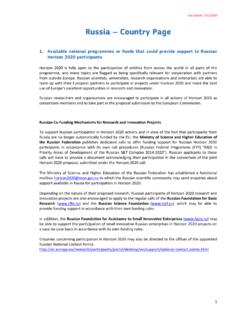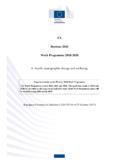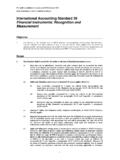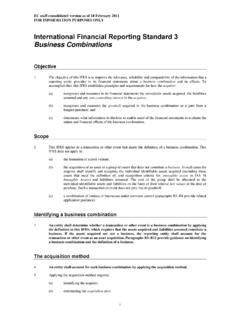Transcription of ARTICLE 29 DATA PROTECTION WORKING PARTY - …
1 ARTICLE 29 data PROTECTION WORKING PARTY This WORKING PARTY was set up under ARTICLE 29 of Directive 95/46/EC. It is an independent European advisory body on data PROTECTION and privacy. Its tasks are described in ARTICLE 30 of Directive 95/46/EC and ARTICLE 15 of Directive 2002/58/EC. The secretariat is provided by Directorate C (Fundamental Rights and Union Citizenship) of the European Commission, Directorate General Justice, B-1049 Brussels, Belgium, Office No MO-59 02/013. Website: 00879/12/EN WP 194 Opinion 04/2012 on Cookie Consent Exemption Adopted on 7 June 2012 2 THE WORKING PARTY ON THE PROTECTION OF INDIVIDUALS WITH REGARD TO THE PROCESSING OF PERSONAL data set up by Directive 95/46/EC of the European Parliament and of the Council of 24 October 1995, having regard to Articles 29 and 30 paragraphs 1(a) and 3 of that Directive, having regard to its Rules of Procedure, HAS ADOPTED THE PRESENT OPINION 1 Introduction ARTICLE of Directive 2002/58/EC, as amended by Directive 2009/136/EC has reinforced the PROTECTION of users of electronic communication networks and services by requiring informed consent before information is stored or accessed in the user s (or subscriber s) terminal device.
2 The requirement applies to all types of information stored or accessed in the user s terminal device although the majority of discussion has centred on the usage of cookies as understood by the definition in RFC62651. As such, this opinion explains how the revised ARTICLE impacts on the usage of cookies but the term should not be regarded as excluding similar technologies. ARTICLE allows cookies to be exempted from the requirement of informed consent, if they satisfy one of the following criteria: CRITERION A: the cookie is used for the sole purpose of carrying out the transmission of a communication over an electronic communications network . CRITERION B: the cookie is strictly necessary in order for the provider of an information society service explicitly requested by the subscriber or user to provide the service . While the requirements for informed consent were already examined in detail by the WORKING PARTY in two Opinions2, this document is designed to analyze the exemptions to this principle, in the context of cookies and related technologies.
3 This analysis is conducted without prejudice to the right to be informed and the eventual right to oppose set forth by Directive 95/46/EC, which apply to personal data processing whether cookies are used or not. 2 Analysis Criterion A The inclusion of the phrase sole purpose in CRITERION A specifically limits the types of processing which may be undertaken using cookies and does not leave much room for 1 2 Opinion 2/2010 on online behavioural advertising 2/2010 and in Opinion 16/2011 on the EASA/IAB Best Practice Recommendation on online behavioural advertising . 3 interpretation. Simply using a cookie to assist, speed up or regulate the transmission of a communication over an electronic communications network is not sufficient. The transmission of the communication must not be possible without the use of the cookie. It can be noted that in the original version of Directive 2002/58/EC, ARTICLE already included this exemption for cookies that were used for the sole purpose of carrying out or facilitating the transmission of a communication over an electronic communications network.
4 The same wording was used in the revised directive, but the words or facilitating were removed, which could be interpreted as a further indication that the European Legislator intended to restrict the perimeter of the exemption afforded by ARTICLE under CRITERION A. At least 3 elements that can be considered as strictly necessary for communications to take place over a network between two parties: 1) The ability to route the information over the network, notably by identifying the communication endpoints. 2) The ability to exchange data items in their intended order, notably by numbering data packets, 3) The ability to detect transmission errors or data loss. The terms the transmission of a communication over an electronic communications network in CRITERION A and in particular the word over are understood to refer to any type of data exchange that takes place with the use of an electronic communication network (as defined in Directive 2002/21/EC), potentially including application level data which fulfills at least one of the properties defined above, without limitation to technical data exchanges needed to establish the electronic communication network itself.
5 As such, CRITERION A encompasses cookies that fulfil at least one of the properties defined above for Internet communications. Criterion B Similarly, the wording of CRITERION B suggests that the European Legislator intended to ensure that the test for qualifying for such an exemption must remain high. Following a direct reading of the directive, a cookie matching CRITERION B has to pass simultaneously the two following tests: 1) The information society service has been explicitly requested by the user: the user (or subscriber) did a positive action to request a service with a clearly defined perimeter. 2) The cookie is strictly needed to enable the information society service: if cookies are disabled, the service will not work. Furthermore, recital 66 of Directive 2009/136/EC underlines that Exceptions to the obligation to provide information and offer the right to refuse should be limited to those situations where the technical storage or access is strictly necessary for the legitimate purpose of enabling the use of a specific service explicitly requested by the subscriber or user.
6 In other words, there has to be a clear link between the strict necessity of a cookie and the delivery of the service explicitly requested by the user for the exemption to apply. 4 Even with such a reading of the directive, it remains to define what constitutes the scope of an information society service explicitly requested by the subscriber or user . An information society service can be composed of many components, some of which are not used by all users or are provided for convenience. For example, an online newspaper can be free to access for all, but may provide some additional functionalities for users that are logged-in such as the ability to leave comments on articles. In turn these additional functionalities may operate with their own cookies. In this particular context, the WORKING PARTY considers that an information society service should be viewed as the sum of several functionalities, and that the precise scope of such a service may thus vary according to the functionalities requested by the user (or subscriber).
7 As a consequence, CRITERION B can be rewritten in terms of functionalities provided by an information society service. In these terms, a cookie matching CRITERION B would need to pass the following tests: 1) A cookie is necessary to provide a specific functionality to the user (or subscriber): if cookies are disabled, the functionality will not be available. 2) This functionality has been explicitly requested by the user (or subscriber), as part of an information society service. Characteristics of a cookie Cookies are often categorized according to the following characteristics: 1) Whether they are session cookies or persistent cookie . 2) Whether they are third PARTY cookies or not. A session cookie is a cookie that is automatically deleted when the user closes his browser, while a persistent cookie is a cookie that remains stored in the user s terminal device until it reaches a defined expiration date (which can be minutes, days or several years in the future).
8 The term third PARTY cookie can be misleading: In the context of European data PROTECTION , the Directive 95/46/EC defines a third PARTY as any natural or legal person, public authority, agency or any other body other than the data subject, the controller, the processor and the persons who, under the direct authority of the controller or the processor, are authorized to process the data . A third PARTY cookie would thus refer to a cookie set by a data controller that is distinct from the one that operates the website visited by the user (as defined by the current URL displayed in the address bar of the browser). However, from the perspective of browsers, the notion of third PARTY is solely defined by looking at the structure of the URL displayed in the address bar of the browser. In this case third PARTY cookies are cookies that are set by websites that belong to a domain that is distinct from the domain of the website visited by the user as displayed in the browser address bar, regardless of any consideration whether that entity is a distinct data controller or not.
9 5 While these two approaches often overlap, they are not always equivalent. For the purpose of this opinion, we will follow the first approach and use the term third PARTY cookie to describe cookies that are set by data controllers that do not operate the website currently visited by the user. Conversely, the term first PARTY cookie will be used to refer to a cookie set by the data controller (or any of its processors) operating the website visited by the user, as defined by the URL that is usually displayed in the browser address bar. Certain characteristics will be taken into account to evaluate if a cookie is strictly necessary for a service, explicitly requested by the user or limited to a sole purpose as worded in CRITERION A or B. A cookie that is exempted from consent should have a lifespan that is in direct relation to the purpose it is used for, and must be set to expire once it is not needed, taking into account the reasonable expectations of the average user or subscriber.
10 This suggests that cookies that match CRITERION A and B will likely be cookies that are set to expire when the browser session ends or even earlier. However, this is not always the case. For example, in the shopping basket scenario presented in the following section, a merchant could set the cookie either to persist past the end of the browser session or for a couple of hours in the future to take into account the fact that the user may accidentally close his browser and could have a reasonable expectation to recover the contents of his shopping basket when he returns to the merchant s website in the following minutes. In other cases, the user may explicitly ask the service to remember some information from one session to another, which requires the use of persistent cookies to fulfil that purpose. Additionally, following the previous definitions, third PARTY cookies are usually not strictly necessary to the user visiting a website since these cookies are usually related to a service that is distinct from the one that has been explicitly requested by the user.












